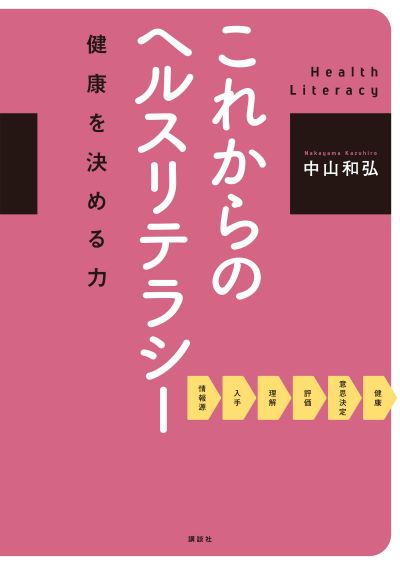ヘルスリテラシーを測定して、COVID-19 関連の心理や行動との関連をみる研究
8.新型コロナウイルスとヘルスリテラシー

『これからのヘルスリテラシー 健康を決める力』(講談社、2022)
サイト『健康を決める力』をアップグレードしました
Amazon
版元ドットコム
情報チェックの「かちもない」と自分らしく決める「おちたか」の動画を公開しました
YouTube TikTok
ヘルスリテラシーとCOVID-19への対応は関連している
では、ヘルスリテラシーは実際のところ、COVID-19 に適切に対応できる効果を持つのでしょうか。世界中で研究が開始され、多様な対象者に調査をして、様々な方法で測定されたヘルスリテラシーがCOVID-19に関する知識や行動と関連していたと指摘されています。

行動との関係
まず、COVID-19に関連したヘルスリテラシーを測定して情報に関する行動との関係を明らかにした研究があります。例えば、ドイツにおいてCOVID-19に関連した包括的なヘルスリテラシーの尺度(HLS-COVID-Q22)を開発し、それが低い人では、新型コロナウイルスに関連した情報において混乱が多いと報告されています[1]。同様に、COVID-19に関連したデジタルヘルスリテラシー(オンラインの健康情報に対するもの)として、入手した情報の信頼性の評価と関連性を判断する能力が高い大学生ほど、サーチエンジンやソーシャルメディアよりは信頼できる公的サイトを利用していたとしています[2]。
メンタルヘルスやQOL(生活の質)との関係
また、COVID-19に関連したヘルスリテラシーと感染予防行動や不安の関連を示したものもあります。ヘルスリテラシーが高い子どもほど手洗いの知識があり行動もできていて、友人との付き合いを減らす傾向があり、健康関連QOLも高かったと報告されています[3]。また、COVID-19に関する知識を中心としたヘルスリテラシーが高いほど[4]、COVID-19に限らず感染症に特化したヘルスリテラシーが高いほど[5]、COVID-19の予防行動をしていたとしています。COVID-19に関連したデジタルヘルスリテラシーが高いほどCOVID-19に対する不安が低く、さらにそれは、首尾一貫感覚SOC(sense of coherence)(ストレス対処能力)を経由してCOVID-19の不安を低めていたと報告されています[6]。
これらに対して、特にCOVID-19とは関連していないヘルスリテラシーを測定して、COVID-19に関連した行動やメンタルヘルス、QOLとの関連についてみた研究があります。ヘルスリテラシーが低い人のほうが、COVID-19の症状や感染予防行動、政府からの情報を理解するのが難しいなど、知識や態度と行動で差があったと報告されています[7]。欧州で開発された包括的なヘルスリテラシーが高いほど、COVID-19の予防行動をしていて[8]、COVID-19の症状が疑われている人でも、抑うつ度が低く健康関連QOLが高く[9]、COVID-19への恐怖感が低かったなどです[10]。また、医療者を対象とした研究では、ヘルスリテラシーが高いほうが、より適切な感染予防管理を実施したり、より健康なライフスタイルがとれていて[11]メンタルヘルスやQOLがより良好であることが報告されています[12]。
急がれるヘルスリテラシーの育成
とくにパンデミックにおいては、政府や市民がすぐに行動を起こさなければならないため、ヘルスリテラシーの向上に時間をかけることは難しく、緊急の対応と封じ込めが求められる事態に個人や社会が備えるためにヘルスリテラシーを育成しておくことが重要です[13]。
(中山和弘)(公開日 2023年3月7日)
文献
[1]Okan O, Bollweg TM, Berens EM, et al. Coronavirus-Related Health Literacy: A Cross-Sectional Study in Adults during the COVID-19 Infodemic in Germany. Int J Environ Res Public Health. 2020;17(15):5503.
[2]Rosário R, Martins MRO, Augusto C, et al. Associations between COVID-19-Related Digital Health Literacy and Online Information-Seeking Behavior among Portuguese University Students. Int J Environ Res Public Health. 2020;17(23):8987.
[3]Riiser K, Helseth S, Haraldstad K,et al. Adolescents' health literacy, health protective measures, and health-related quality of life during the Covid-19 pandemic. Pakpour AH, ed. PLoS One. 2020;15(8):e0238161.
[4]Wong JYH, Wai AKC, Zhao S, et al. Association of Individual Health Literacy with Preventive Behaviours and Family Well-Being during COVID-19 Pandemic: Mediating Role of Family Information Sharing. Int J Environ Res Public Health. 2020;17(23):8838.
[5]Wang H, Cheong PL, Wu J, Van IK. Health Literacy Regarding Infectious Disease Predicts COVID-19 Preventive Behaviors: A Pathway Analysis. Asia Pacific J Public Heal. 2021;33(5):523-529.
[6]Leung AYM, Parial LL, Tolabing MC, et al. Sense of coherence mediates the relationship between digital health literacy and anxiety about the future in aging population during the COVID-19 pandemic: a path analysis. Aging Ment Health. Published online January 13, 2021:1-10.
[7]McCaffery K, Dodd R, Cvejic E, et al. Health literacy and disparities in COVID-19-related knowledge, attitudes, beliefs and behaviours in Australia. Public Health Res Pract. 2020 Dec 9;30(4):30342012.
[8]Gautam V, S D, Rustagi N, et al. Health literacy, preventive COVID 19 behaviour and adherence to chronic disease treatment during lockdown among patients registered at primary health facility in urban Jodhpur, Rajasthan. Diabetes Metab Syndr Clin Res Rev. 2021;15(1):205-211.
[9]Nguyen HC, Nguyen MH, Do BN, et al. People with Suspected COVID-19 Symptoms Were More Likely Depressed and Had Lower Health-Related Quality of Life: The Potential Benefit of Health Literacy. J Clin Med. 2020;9(4):965.
[10]Duong MC, Nguyen HT, Duong BT, Vu MT. The Levels of COVID-19 Related Health Literacy among University Students in Vietnam. Infect Chemother. 2021;53(1):107.
[11]Do BN, Tran T V., Phan DT, et al. Health Literacy, eHealth Literacy, Adherence to Infection Prevention and Control Procedures, Lifestyle Changes, and Suspected COVID-19 Symptoms Among Health Care Workers During Lockdown: Online Survey. J Med Internet Res. 2020;22(11):e22894.
[12]Košir U, Sørensen K. COVID-19: the key to flattening the curve is health literacy. Perspect Public Health. Published online July 10, 2020:175791392093671.
[13]Tran T V., Nguyen HC, Pham L V, et al. Impacts and interactions of COVID-19 response involvement, health-related behaviours, health literacy on anxiety, depression and health-related quality of life among healthcare workers: a cross-sectional study. BMJ Open. 2020;10(12):e041394.





